E1144 Certificate III Individual Support Module 2 Knowledge Test
VerifiedAdded on 2020/04/15
|17
|5337
|35
Homework Assignment
AI Summary
This homework assignment, designed for a Certificate III in Individual Support, focuses on assessing a student's understanding of individualised support principles, communication, and ethical practices within the context of care for an individual with multiple sclerosis. The assignment requires the student to apply person-centered and strengths-based approaches, as well as active support strategies, to develop an individualised care plan for Emma. The assignment covers the importance of determining support needs, identifying goals and strategies, preparing for support activities, gathering necessary equipment, and maintaining a safe and comfortable environment. Furthermore, the student must address the concept of dignity of risk, balancing the client's autonomy with the duty of care. The assignment includes short-answer questions that assess the student's ability to describe and apply these concepts in practical scenarios, demonstrating their knowledge of providing holistic and person-centered care.
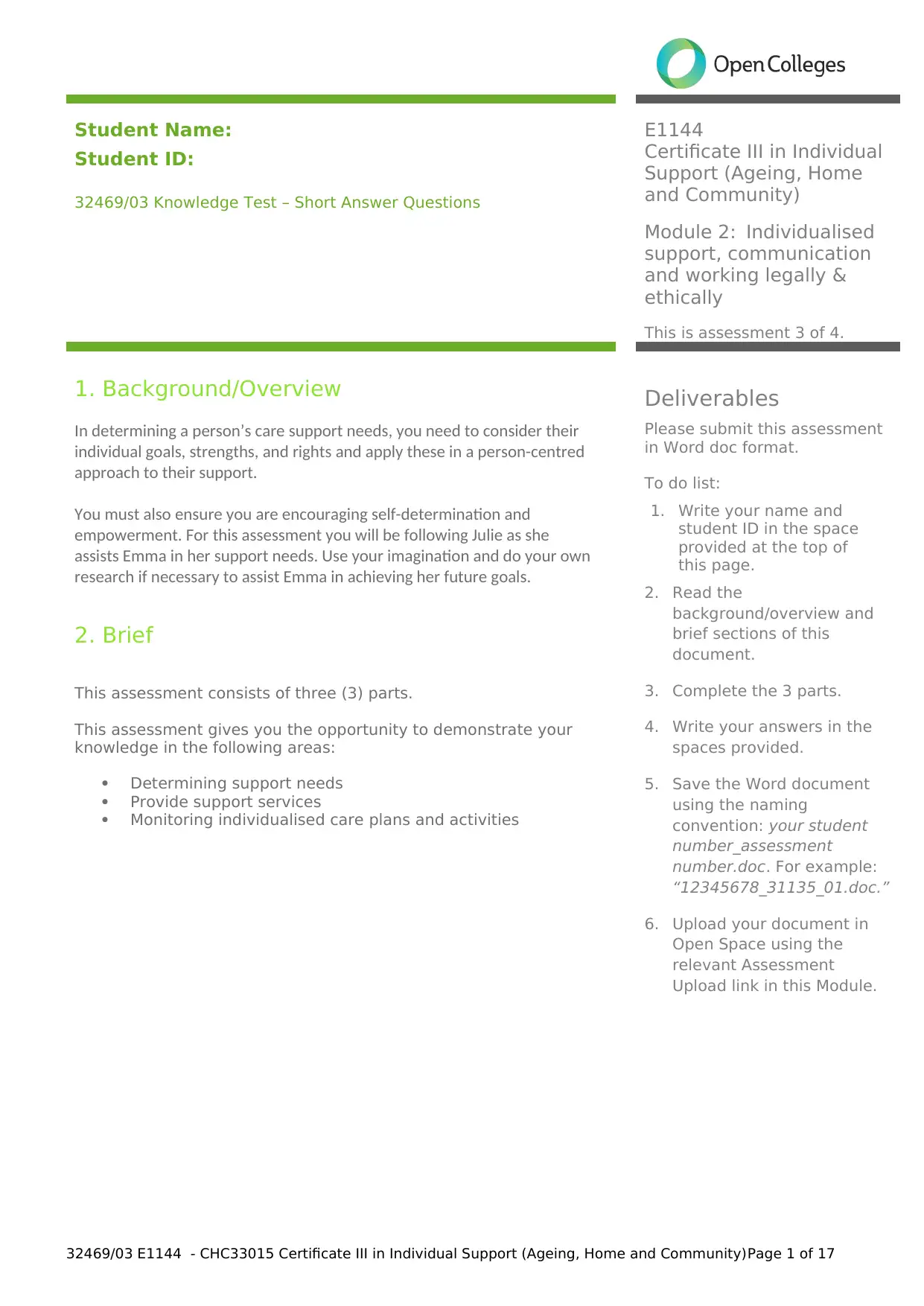
Student Name:
Student ID:
32469/03 Knowledge Test – Short Answer Questions
E1144
Certificate III in Individual
Support (Ageing, Home
and Community)
Module 2: Individualised
support, communication
and working legally &
ethically
This is assessment 3 of 4.
1. Background/Overview
In determining a person’s care support needs, you need to consider their
individual goals, strengths, and rights and apply these in a person-centred
approach to their support.
You must also ensure you are encouraging self-determination and
empowerment. For this assessment you will be following Julie as she
assists Emma in her support needs. Use your imagination and do your own
research if necessary to assist Emma in achieving her future goals.
2. Brief
This assessment consists of three (3) parts.
This assessment gives you the opportunity to demonstrate your
knowledge in the following areas:
Determining support needs
Provide support services
Monitoring individualised care plans and activities
Deliverables
Please submit this assessment
in Word doc format.
To do list:
1. Write your name and
student ID in the space
provided at the top of
this page.
2. Read the
background/overview and
brief sections of this
document.
3. Complete the 3 parts.
4. Write your answers in the
spaces provided.
5. Save the Word document
using the naming
convention: your student
number_assessment
number.doc. For example:
“12345678_31135_01.doc.”
6. Upload your document in
Open Space using the
relevant Assessment
Upload link in this Module.
32469/03 E1144 - CHC33015 Certificate III in Individual Support (Ageing, Home and Community)Page 1 of 17
Student ID:
32469/03 Knowledge Test – Short Answer Questions
E1144
Certificate III in Individual
Support (Ageing, Home
and Community)
Module 2: Individualised
support, communication
and working legally &
ethically
This is assessment 3 of 4.
1. Background/Overview
In determining a person’s care support needs, you need to consider their
individual goals, strengths, and rights and apply these in a person-centred
approach to their support.
You must also ensure you are encouraging self-determination and
empowerment. For this assessment you will be following Julie as she
assists Emma in her support needs. Use your imagination and do your own
research if necessary to assist Emma in achieving her future goals.
2. Brief
This assessment consists of three (3) parts.
This assessment gives you the opportunity to demonstrate your
knowledge in the following areas:
Determining support needs
Provide support services
Monitoring individualised care plans and activities
Deliverables
Please submit this assessment
in Word doc format.
To do list:
1. Write your name and
student ID in the space
provided at the top of
this page.
2. Read the
background/overview and
brief sections of this
document.
3. Complete the 3 parts.
4. Write your answers in the
spaces provided.
5. Save the Word document
using the naming
convention: your student
number_assessment
number.doc. For example:
“12345678_31135_01.doc.”
6. Upload your document in
Open Space using the
relevant Assessment
Upload link in this Module.
32469/03 E1144 - CHC33015 Certificate III in Individual Support (Ageing, Home and Community)Page 1 of 17
Paraphrase This Document
Need a fresh take? Get an instant paraphrase of this document with our AI Paraphraser

3. Activities
Answer the following short-answer questions:
Your written answers should be approximate 50-100 words in length (+/-10%) per question
unless otherwise indicated. The word count is a guideline and you can present your answers
in narrative or bullet point format.
Ensure you acknowledge and cite your sources accordingly – this is important whether you
use your own words or another writer’s. You can review the Academic Referencing Guide in
your student handbook.
32469/03 E1144 - CHC33015 Certificate III in Individual Support (Ageing, Home and Community)Page 2 of 17
Answer the following short-answer questions:
Your written answers should be approximate 50-100 words in length (+/-10%) per question
unless otherwise indicated. The word count is a guideline and you can present your answers
in narrative or bullet point format.
Ensure you acknowledge and cite your sources accordingly – this is important whether you
use your own words or another writer’s. You can review the Academic Referencing Guide in
your student handbook.
32469/03 E1144 - CHC33015 Certificate III in Individual Support (Ageing, Home and Community)Page 2 of 17
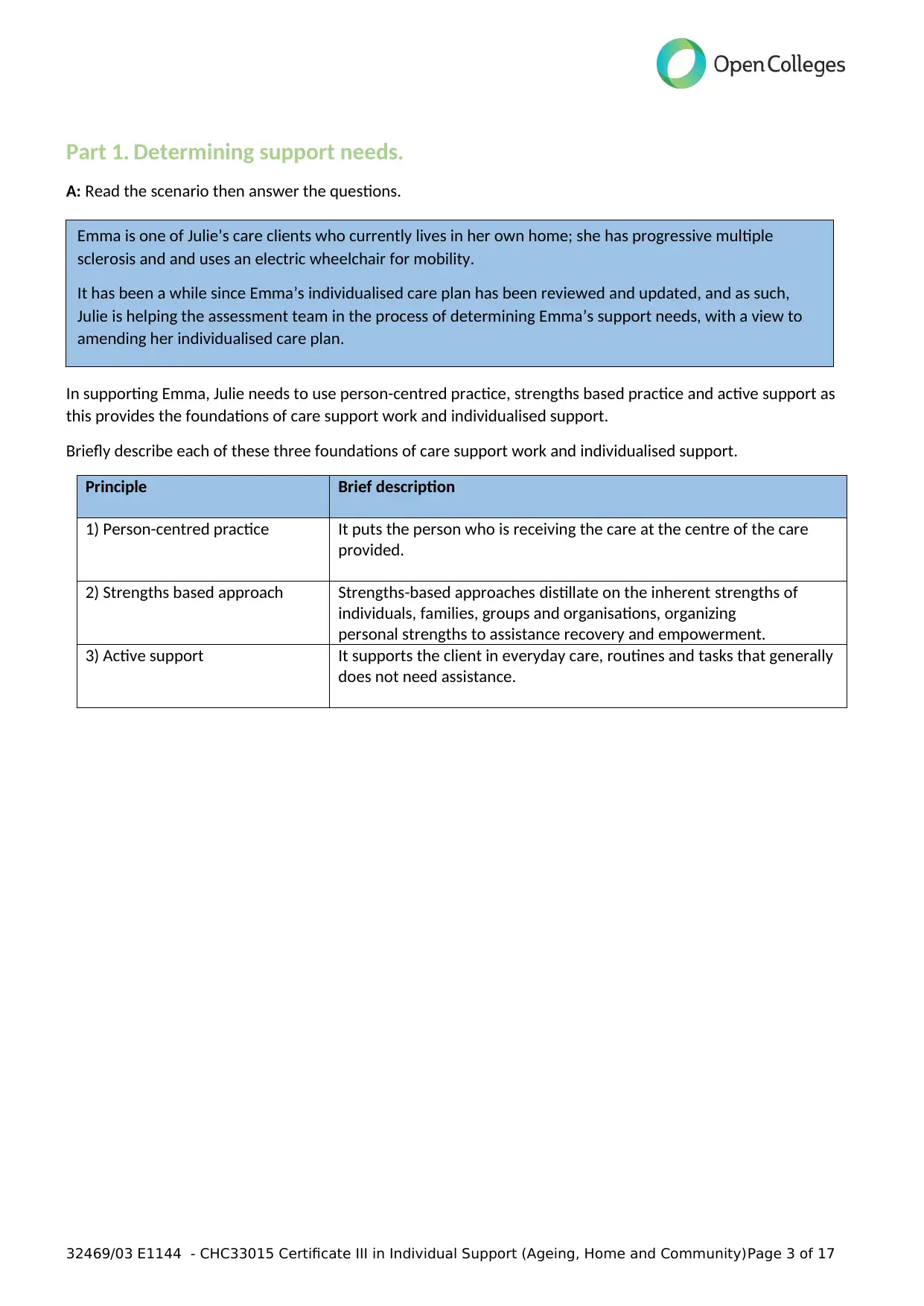
Part 1. Determining support needs.
A: Read the scenario then answer the questions.
In supporting Emma, Julie needs to use person-centred practice, strengths based practice and active support as
this provides the foundations of care support work and individualised support.
Briefly describe each of these three foundations of care support work and individualised support.
Principle Brief description
1) Person-centred practice It puts the person who is receiving the care at the centre of the care
provided.
2) Strengths based approach Strengths-based approaches distillate on the inherent strengths of
individuals, families, groups and organisations, organizing
personal strengths to assistance recovery and empowerment.
3) Active support It supports the client in everyday care, routines and tasks that generally
does not need assistance.
32469/03 E1144 - CHC33015 Certificate III in Individual Support (Ageing, Home and Community)Page 3 of 17
Emma is one of Julie’s care clients who currently lives in her own home; she has progressive multiple
sclerosis and and uses an electric wheelchair for mobility.
It has been a while since Emma’s individualised care plan has been reviewed and updated, and as such,
Julie is helping the assessment team in the process of determining Emma’s support needs, with a view to
amending her individualised care plan.
A: Read the scenario then answer the questions.
In supporting Emma, Julie needs to use person-centred practice, strengths based practice and active support as
this provides the foundations of care support work and individualised support.
Briefly describe each of these three foundations of care support work and individualised support.
Principle Brief description
1) Person-centred practice It puts the person who is receiving the care at the centre of the care
provided.
2) Strengths based approach Strengths-based approaches distillate on the inherent strengths of
individuals, families, groups and organisations, organizing
personal strengths to assistance recovery and empowerment.
3) Active support It supports the client in everyday care, routines and tasks that generally
does not need assistance.
32469/03 E1144 - CHC33015 Certificate III in Individual Support (Ageing, Home and Community)Page 3 of 17
Emma is one of Julie’s care clients who currently lives in her own home; she has progressive multiple
sclerosis and and uses an electric wheelchair for mobility.
It has been a while since Emma’s individualised care plan has been reviewed and updated, and as such,
Julie is helping the assessment team in the process of determining Emma’s support needs, with a view to
amending her individualised care plan.
⊘ This is a preview!⊘
Do you want full access?
Subscribe today to unlock all pages.

Trusted by 1+ million students worldwide
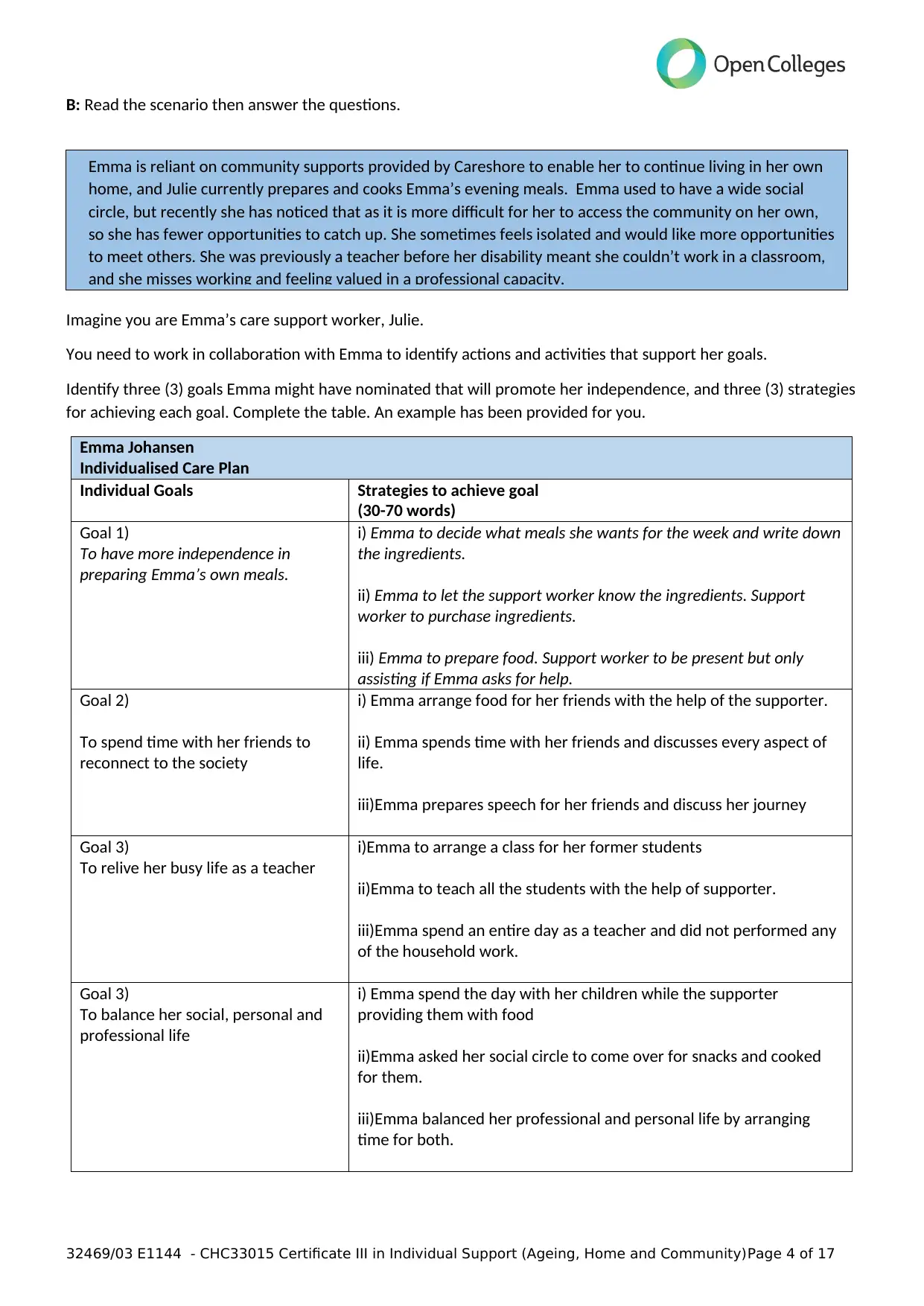
B: Read the scenario then answer the questions.
Imagine you are Emma’s care support worker, Julie.
You need to work in collaboration with Emma to identify actions and activities that support her goals.
Identify three (3) goals Emma might have nominated that will promote her independence, and three (3) strategies
for achieving each goal. Complete the table. An example has been provided for you.
Emma Johansen
Individualised Care Plan
Individual Goals Strategies to achieve goal
(30-70 words)
Goal 1)
To have more independence in
preparing Emma’s own meals.
i) Emma to decide what meals she wants for the week and write down
the ingredients.
ii) Emma to let the support worker know the ingredients. Support
worker to purchase ingredients.
iii) Emma to prepare food. Support worker to be present but only
assisting if Emma asks for help.
Goal 2)
To spend time with her friends to
reconnect to the society
i) Emma arrange food for her friends with the help of the supporter.
ii) Emma spends time with her friends and discusses every aspect of
life.
iii)Emma prepares speech for her friends and discuss her journey
Goal 3)
To relive her busy life as a teacher
i)Emma to arrange a class for her former students
ii)Emma to teach all the students with the help of supporter.
iii)Emma spend an entire day as a teacher and did not performed any
of the household work.
Goal 3)
To balance her social, personal and
professional life
i) Emma spend the day with her children while the supporter
providing them with food
ii)Emma asked her social circle to come over for snacks and cooked
for them.
iii)Emma balanced her professional and personal life by arranging
time for both.
32469/03 E1144 - CHC33015 Certificate III in Individual Support (Ageing, Home and Community)Page 4 of 17
Emma is reliant on community supports provided by Careshore to enable her to continue living in her own
home, and Julie currently prepares and cooks Emma’s evening meals. Emma used to have a wide social
circle, but recently she has noticed that as it is more difficult for her to access the community on her own,
so she has fewer opportunities to catch up. She sometimes feels isolated and would like more opportunities
to meet others. She was previously a teacher before her disability meant she couldn’t work in a classroom,
and she misses working and feeling valued in a professional capacity.
Imagine you are Emma’s care support worker, Julie.
You need to work in collaboration with Emma to identify actions and activities that support her goals.
Identify three (3) goals Emma might have nominated that will promote her independence, and three (3) strategies
for achieving each goal. Complete the table. An example has been provided for you.
Emma Johansen
Individualised Care Plan
Individual Goals Strategies to achieve goal
(30-70 words)
Goal 1)
To have more independence in
preparing Emma’s own meals.
i) Emma to decide what meals she wants for the week and write down
the ingredients.
ii) Emma to let the support worker know the ingredients. Support
worker to purchase ingredients.
iii) Emma to prepare food. Support worker to be present but only
assisting if Emma asks for help.
Goal 2)
To spend time with her friends to
reconnect to the society
i) Emma arrange food for her friends with the help of the supporter.
ii) Emma spends time with her friends and discusses every aspect of
life.
iii)Emma prepares speech for her friends and discuss her journey
Goal 3)
To relive her busy life as a teacher
i)Emma to arrange a class for her former students
ii)Emma to teach all the students with the help of supporter.
iii)Emma spend an entire day as a teacher and did not performed any
of the household work.
Goal 3)
To balance her social, personal and
professional life
i) Emma spend the day with her children while the supporter
providing them with food
ii)Emma asked her social circle to come over for snacks and cooked
for them.
iii)Emma balanced her professional and personal life by arranging
time for both.
32469/03 E1144 - CHC33015 Certificate III in Individual Support (Ageing, Home and Community)Page 4 of 17
Emma is reliant on community supports provided by Careshore to enable her to continue living in her own
home, and Julie currently prepares and cooks Emma’s evening meals. Emma used to have a wide social
circle, but recently she has noticed that as it is more difficult for her to access the community on her own,
so she has fewer opportunities to catch up. She sometimes feels isolated and would like more opportunities
to meet others. She was previously a teacher before her disability meant she couldn’t work in a classroom,
and she misses working and feeling valued in a professional capacity.
Paraphrase This Document
Need a fresh take? Get an instant paraphrase of this document with our AI Paraphraser
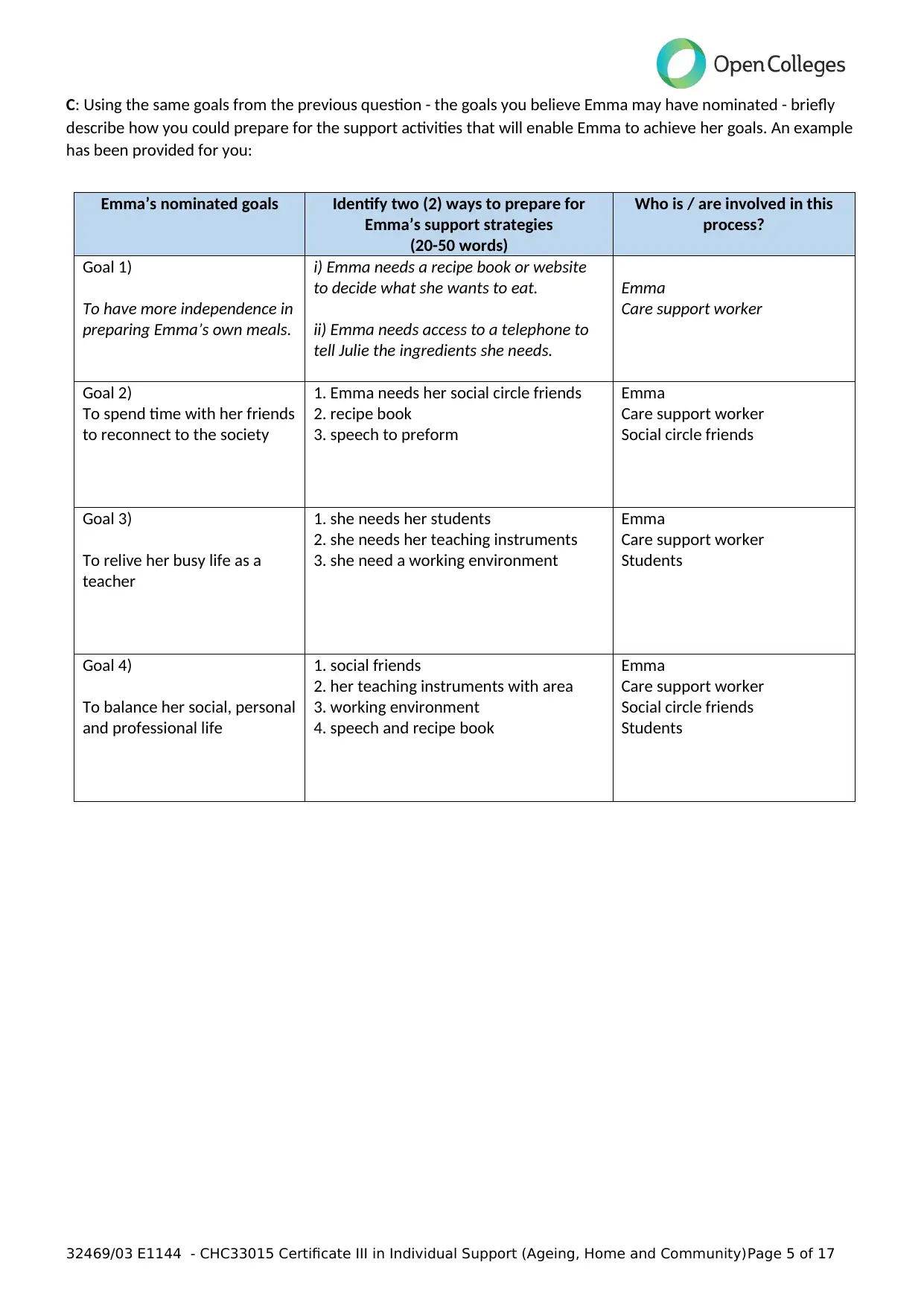
C: Using the same goals from the previous question - the goals you believe Emma may have nominated - briefly
describe how you could prepare for the support activities that will enable Emma to achieve her goals. An example
has been provided for you:
32469/03 E1144 - CHC33015 Certificate III in Individual Support (Ageing, Home and Community)Page 5 of 17
Emma’s nominated goals Identify two (2) ways to prepare for
Emma’s support strategies
(20-50 words)
Who is / are involved in this
process?
Goal 1)
To have more independence in
preparing Emma’s own meals.
i) Emma needs a recipe book or website
to decide what she wants to eat.
ii) Emma needs access to a telephone to
tell Julie the ingredients she needs.
Emma
Care support worker
Goal 2)
To spend time with her friends
to reconnect to the society
1. Emma needs her social circle friends
2. recipe book
3. speech to preform
Emma
Care support worker
Social circle friends
Goal 3)
To relive her busy life as a
teacher
1. she needs her students
2. she needs her teaching instruments
3. she need a working environment
Emma
Care support worker
Students
Goal 4)
To balance her social, personal
and professional life
1. social friends
2. her teaching instruments with area
3. working environment
4. speech and recipe book
Emma
Care support worker
Social circle friends
Students
describe how you could prepare for the support activities that will enable Emma to achieve her goals. An example
has been provided for you:
32469/03 E1144 - CHC33015 Certificate III in Individual Support (Ageing, Home and Community)Page 5 of 17
Emma’s nominated goals Identify two (2) ways to prepare for
Emma’s support strategies
(20-50 words)
Who is / are involved in this
process?
Goal 1)
To have more independence in
preparing Emma’s own meals.
i) Emma needs a recipe book or website
to decide what she wants to eat.
ii) Emma needs access to a telephone to
tell Julie the ingredients she needs.
Emma
Care support worker
Goal 2)
To spend time with her friends
to reconnect to the society
1. Emma needs her social circle friends
2. recipe book
3. speech to preform
Emma
Care support worker
Social circle friends
Goal 3)
To relive her busy life as a
teacher
1. she needs her students
2. she needs her teaching instruments
3. she need a working environment
Emma
Care support worker
Students
Goal 4)
To balance her social, personal
and professional life
1. social friends
2. her teaching instruments with area
3. working environment
4. speech and recipe book
Emma
Care support worker
Social circle friends
Students
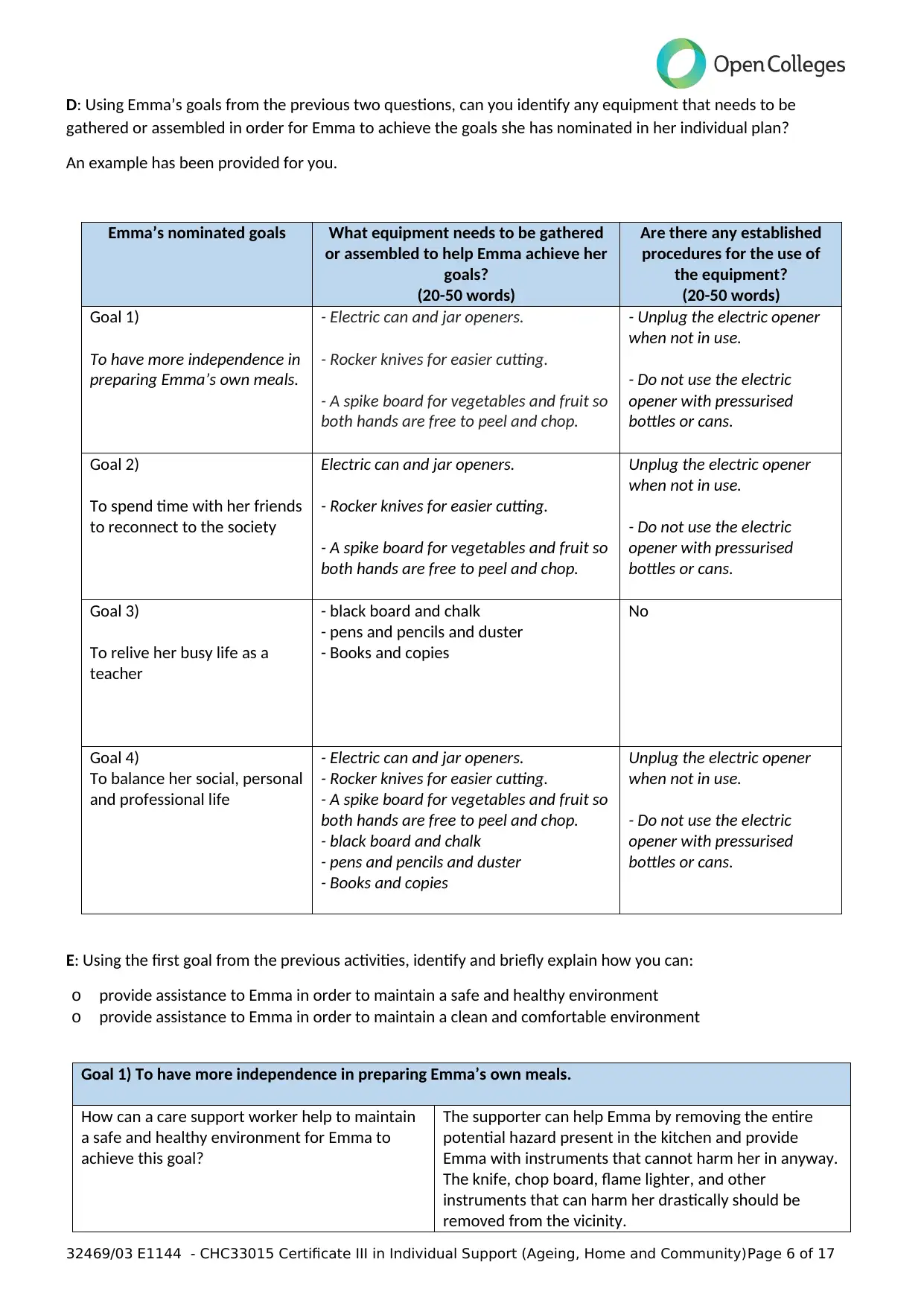
D: Using Emma’s goals from the previous two questions, can you identify any equipment that needs to be
gathered or assembled in order for Emma to achieve the goals she has nominated in her individual plan?
An example has been provided for you.
Emma’s nominated goals What equipment needs to be gathered
or assembled to help Emma achieve her
goals?
(20-50 words)
Are there any established
procedures for the use of
the equipment?
(20-50 words)
Goal 1)
To have more independence in
preparing Emma’s own meals.
- Electric can and jar openers.
- Rocker knives for easier cutting.
- A spike board for vegetables and fruit so
both hands are free to peel and chop.
- Unplug the electric opener
when not in use.
- Do not use the electric
opener with pressurised
bottles or cans.
Goal 2)
To spend time with her friends
to reconnect to the society
Electric can and jar openers.
- Rocker knives for easier cutting.
- A spike board for vegetables and fruit so
both hands are free to peel and chop.
Unplug the electric opener
when not in use.
- Do not use the electric
opener with pressurised
bottles or cans.
Goal 3)
To relive her busy life as a
teacher
- black board and chalk
- pens and pencils and duster
- Books and copies
No
Goal 4)
To balance her social, personal
and professional life
- Electric can and jar openers.
- Rocker knives for easier cutting.
- A spike board for vegetables and fruit so
both hands are free to peel and chop.
- black board and chalk
- pens and pencils and duster
- Books and copies
Unplug the electric opener
when not in use.
- Do not use the electric
opener with pressurised
bottles or cans.
E: Using the first goal from the previous activities, identify and briefly explain how you can:
o provide assistance to Emma in order to maintain a safe and healthy environment
o provide assistance to Emma in order to maintain a clean and comfortable environment
Goal 1) To have more independence in preparing Emma’s own meals.
How can a care support worker help to maintain
a safe and healthy environment for Emma to
achieve this goal?
The supporter can help Emma by removing the entire
potential hazard present in the kitchen and provide
Emma with instruments that cannot harm her in anyway.
The knife, chop board, flame lighter, and other
instruments that can harm her drastically should be
removed from the vicinity.
32469/03 E1144 - CHC33015 Certificate III in Individual Support (Ageing, Home and Community)Page 6 of 17
gathered or assembled in order for Emma to achieve the goals she has nominated in her individual plan?
An example has been provided for you.
Emma’s nominated goals What equipment needs to be gathered
or assembled to help Emma achieve her
goals?
(20-50 words)
Are there any established
procedures for the use of
the equipment?
(20-50 words)
Goal 1)
To have more independence in
preparing Emma’s own meals.
- Electric can and jar openers.
- Rocker knives for easier cutting.
- A spike board for vegetables and fruit so
both hands are free to peel and chop.
- Unplug the electric opener
when not in use.
- Do not use the electric
opener with pressurised
bottles or cans.
Goal 2)
To spend time with her friends
to reconnect to the society
Electric can and jar openers.
- Rocker knives for easier cutting.
- A spike board for vegetables and fruit so
both hands are free to peel and chop.
Unplug the electric opener
when not in use.
- Do not use the electric
opener with pressurised
bottles or cans.
Goal 3)
To relive her busy life as a
teacher
- black board and chalk
- pens and pencils and duster
- Books and copies
No
Goal 4)
To balance her social, personal
and professional life
- Electric can and jar openers.
- Rocker knives for easier cutting.
- A spike board for vegetables and fruit so
both hands are free to peel and chop.
- black board and chalk
- pens and pencils and duster
- Books and copies
Unplug the electric opener
when not in use.
- Do not use the electric
opener with pressurised
bottles or cans.
E: Using the first goal from the previous activities, identify and briefly explain how you can:
o provide assistance to Emma in order to maintain a safe and healthy environment
o provide assistance to Emma in order to maintain a clean and comfortable environment
Goal 1) To have more independence in preparing Emma’s own meals.
How can a care support worker help to maintain
a safe and healthy environment for Emma to
achieve this goal?
The supporter can help Emma by removing the entire
potential hazard present in the kitchen and provide
Emma with instruments that cannot harm her in anyway.
The knife, chop board, flame lighter, and other
instruments that can harm her drastically should be
removed from the vicinity.
32469/03 E1144 - CHC33015 Certificate III in Individual Support (Ageing, Home and Community)Page 6 of 17
⊘ This is a preview!⊘
Do you want full access?
Subscribe today to unlock all pages.

Trusted by 1+ million students worldwide

How can a care support worker help to maintain
a clean and comfortable environment for Emma
to achieve this goal? (50-100 words)
The supporter should clean all the workstation Emma
was working. This will maintain the hygiene of the place
and the chances of spreading infection will be less.
32469/03 E1144 - CHC33015 Certificate III in Individual Support (Ageing, Home and Community)Page 7 of 17
a clean and comfortable environment for Emma
to achieve this goal? (50-100 words)
The supporter should clean all the workstation Emma
was working. This will maintain the hygiene of the place
and the chances of spreading infection will be less.
32469/03 E1144 - CHC33015 Certificate III in Individual Support (Ageing, Home and Community)Page 7 of 17
Paraphrase This Document
Need a fresh take? Get an instant paraphrase of this document with our AI Paraphraser
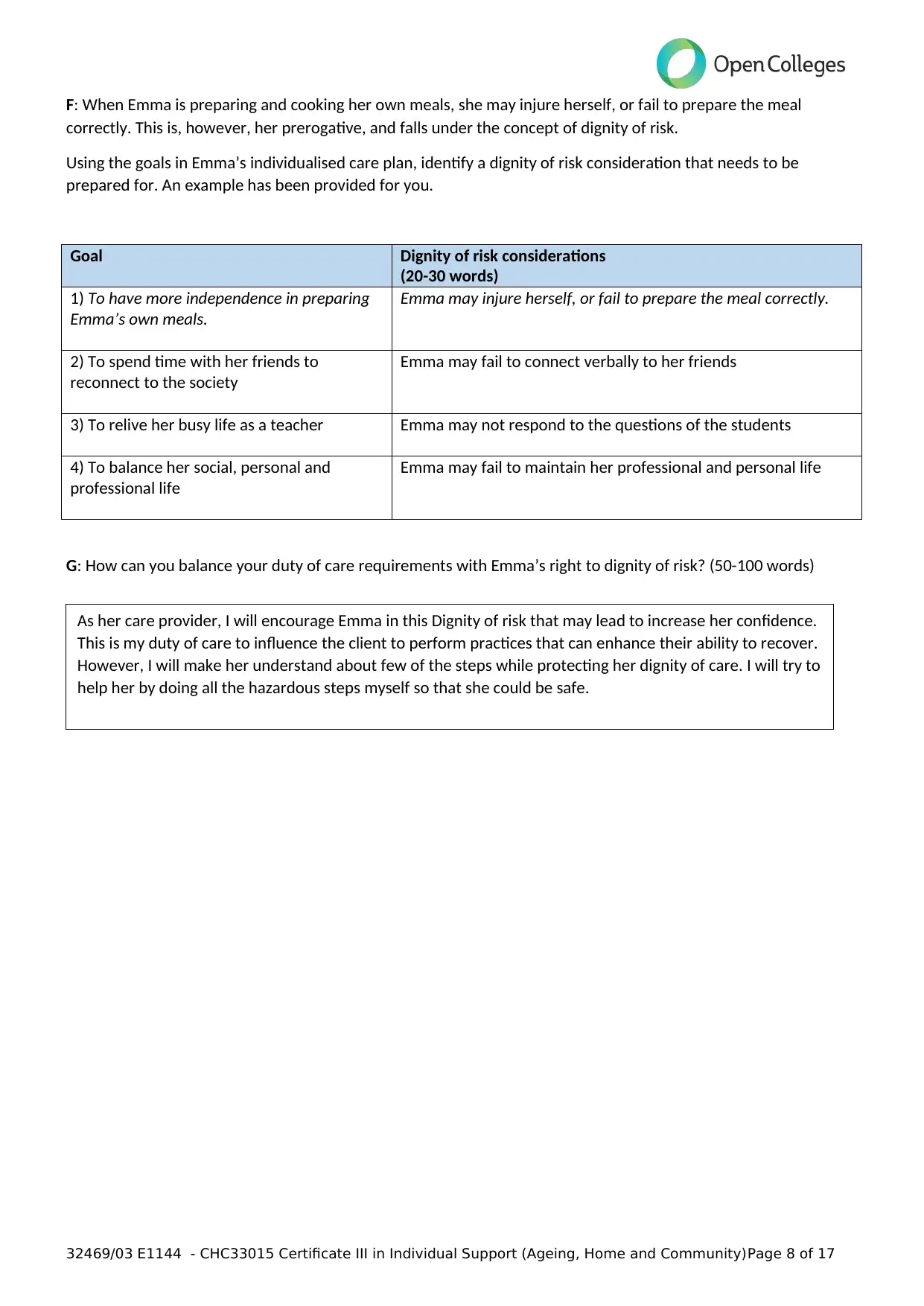
F: When Emma is preparing and cooking her own meals, she may injure herself, or fail to prepare the meal
correctly. This is, however, her prerogative, and falls under the concept of dignity of risk.
Using the goals in Emma’s individualised care plan, identify a dignity of risk consideration that needs to be
prepared for. An example has been provided for you.
Goal Dignity of risk considerations
(20-30 words)
1) To have more independence in preparing
Emma’s own meals.
Emma may injure herself, or fail to prepare the meal correctly.
2) To spend time with her friends to
reconnect to the society
Emma may fail to connect verbally to her friends
3) To relive her busy life as a teacher Emma may not respond to the questions of the students
4) To balance her social, personal and
professional life
Emma may fail to maintain her professional and personal life
G: How can you balance your duty of care requirements with Emma’s right to dignity of risk? (50-100 words)
32469/03 E1144 - CHC33015 Certificate III in Individual Support (Ageing, Home and Community)Page 8 of 17
As her care provider, I will encourage Emma in this Dignity of risk that may lead to increase her confidence.
This is my duty of care to influence the client to perform practices that can enhance their ability to recover.
However, I will make her understand about few of the steps while protecting her dignity of care. I will try to
help her by doing all the hazardous steps myself so that she could be safe.
correctly. This is, however, her prerogative, and falls under the concept of dignity of risk.
Using the goals in Emma’s individualised care plan, identify a dignity of risk consideration that needs to be
prepared for. An example has been provided for you.
Goal Dignity of risk considerations
(20-30 words)
1) To have more independence in preparing
Emma’s own meals.
Emma may injure herself, or fail to prepare the meal correctly.
2) To spend time with her friends to
reconnect to the society
Emma may fail to connect verbally to her friends
3) To relive her busy life as a teacher Emma may not respond to the questions of the students
4) To balance her social, personal and
professional life
Emma may fail to maintain her professional and personal life
G: How can you balance your duty of care requirements with Emma’s right to dignity of risk? (50-100 words)
32469/03 E1144 - CHC33015 Certificate III in Individual Support (Ageing, Home and Community)Page 8 of 17
As her care provider, I will encourage Emma in this Dignity of risk that may lead to increase her confidence.
This is my duty of care to influence the client to perform practices that can enhance their ability to recover.
However, I will make her understand about few of the steps while protecting her dignity of care. I will try to
help her by doing all the hazardous steps myself so that she could be safe.
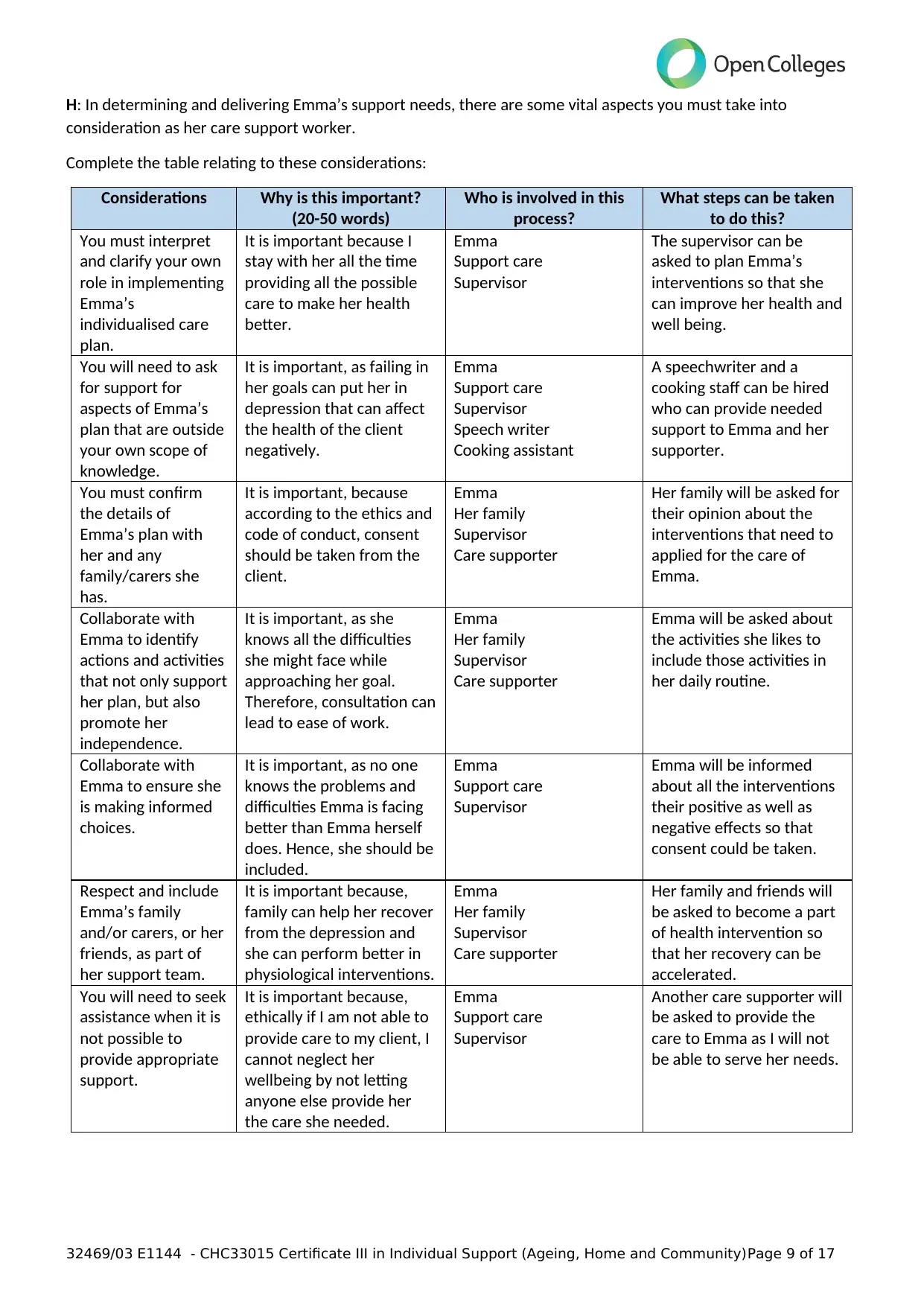
H: In determining and delivering Emma’s support needs, there are some vital aspects you must take into
consideration as her care support worker.
Complete the table relating to these considerations:
Considerations Why is this important?
(20-50 words)
Who is involved in this
process?
What steps can be taken
to do this?
You must interpret
and clarify your own
role in implementing
Emma’s
individualised care
plan.
It is important because I
stay with her all the time
providing all the possible
care to make her health
better.
Emma
Support care
Supervisor
The supervisor can be
asked to plan Emma’s
interventions so that she
can improve her health and
well being.
You will need to ask
for support for
aspects of Emma’s
plan that are outside
your own scope of
knowledge.
It is important, as failing in
her goals can put her in
depression that can affect
the health of the client
negatively.
Emma
Support care
Supervisor
Speech writer
Cooking assistant
A speechwriter and a
cooking staff can be hired
who can provide needed
support to Emma and her
supporter.
You must confirm
the details of
Emma’s plan with
her and any
family/carers she
has.
It is important, because
according to the ethics and
code of conduct, consent
should be taken from the
client.
Emma
Her family
Supervisor
Care supporter
Her family will be asked for
their opinion about the
interventions that need to
applied for the care of
Emma.
Collaborate with
Emma to identify
actions and activities
that not only support
her plan, but also
promote her
independence.
It is important, as she
knows all the difficulties
she might face while
approaching her goal.
Therefore, consultation can
lead to ease of work.
Emma
Her family
Supervisor
Care supporter
Emma will be asked about
the activities she likes to
include those activities in
her daily routine.
Collaborate with
Emma to ensure she
is making informed
choices.
It is important, as no one
knows the problems and
difficulties Emma is facing
better than Emma herself
does. Hence, she should be
included.
Emma
Support care
Supervisor
Emma will be informed
about all the interventions
their positive as well as
negative effects so that
consent could be taken.
Respect and include
Emma’s family
and/or carers, or her
friends, as part of
her support team.
It is important because,
family can help her recover
from the depression and
she can perform better in
physiological interventions.
Emma
Her family
Supervisor
Care supporter
Her family and friends will
be asked to become a part
of health intervention so
that her recovery can be
accelerated.
You will need to seek
assistance when it is
not possible to
provide appropriate
support.
It is important because,
ethically if I am not able to
provide care to my client, I
cannot neglect her
wellbeing by not letting
anyone else provide her
the care she needed.
Emma
Support care
Supervisor
Another care supporter will
be asked to provide the
care to Emma as I will not
be able to serve her needs.
32469/03 E1144 - CHC33015 Certificate III in Individual Support (Ageing, Home and Community)Page 9 of 17
consideration as her care support worker.
Complete the table relating to these considerations:
Considerations Why is this important?
(20-50 words)
Who is involved in this
process?
What steps can be taken
to do this?
You must interpret
and clarify your own
role in implementing
Emma’s
individualised care
plan.
It is important because I
stay with her all the time
providing all the possible
care to make her health
better.
Emma
Support care
Supervisor
The supervisor can be
asked to plan Emma’s
interventions so that she
can improve her health and
well being.
You will need to ask
for support for
aspects of Emma’s
plan that are outside
your own scope of
knowledge.
It is important, as failing in
her goals can put her in
depression that can affect
the health of the client
negatively.
Emma
Support care
Supervisor
Speech writer
Cooking assistant
A speechwriter and a
cooking staff can be hired
who can provide needed
support to Emma and her
supporter.
You must confirm
the details of
Emma’s plan with
her and any
family/carers she
has.
It is important, because
according to the ethics and
code of conduct, consent
should be taken from the
client.
Emma
Her family
Supervisor
Care supporter
Her family will be asked for
their opinion about the
interventions that need to
applied for the care of
Emma.
Collaborate with
Emma to identify
actions and activities
that not only support
her plan, but also
promote her
independence.
It is important, as she
knows all the difficulties
she might face while
approaching her goal.
Therefore, consultation can
lead to ease of work.
Emma
Her family
Supervisor
Care supporter
Emma will be asked about
the activities she likes to
include those activities in
her daily routine.
Collaborate with
Emma to ensure she
is making informed
choices.
It is important, as no one
knows the problems and
difficulties Emma is facing
better than Emma herself
does. Hence, she should be
included.
Emma
Support care
Supervisor
Emma will be informed
about all the interventions
their positive as well as
negative effects so that
consent could be taken.
Respect and include
Emma’s family
and/or carers, or her
friends, as part of
her support team.
It is important because,
family can help her recover
from the depression and
she can perform better in
physiological interventions.
Emma
Her family
Supervisor
Care supporter
Her family and friends will
be asked to become a part
of health intervention so
that her recovery can be
accelerated.
You will need to seek
assistance when it is
not possible to
provide appropriate
support.
It is important because,
ethically if I am not able to
provide care to my client, I
cannot neglect her
wellbeing by not letting
anyone else provide her
the care she needed.
Emma
Support care
Supervisor
Another care supporter will
be asked to provide the
care to Emma as I will not
be able to serve her needs.
32469/03 E1144 - CHC33015 Certificate III in Individual Support (Ageing, Home and Community)Page 9 of 17
⊘ This is a preview!⊘
Do you want full access?
Subscribe today to unlock all pages.

Trusted by 1+ million students worldwide
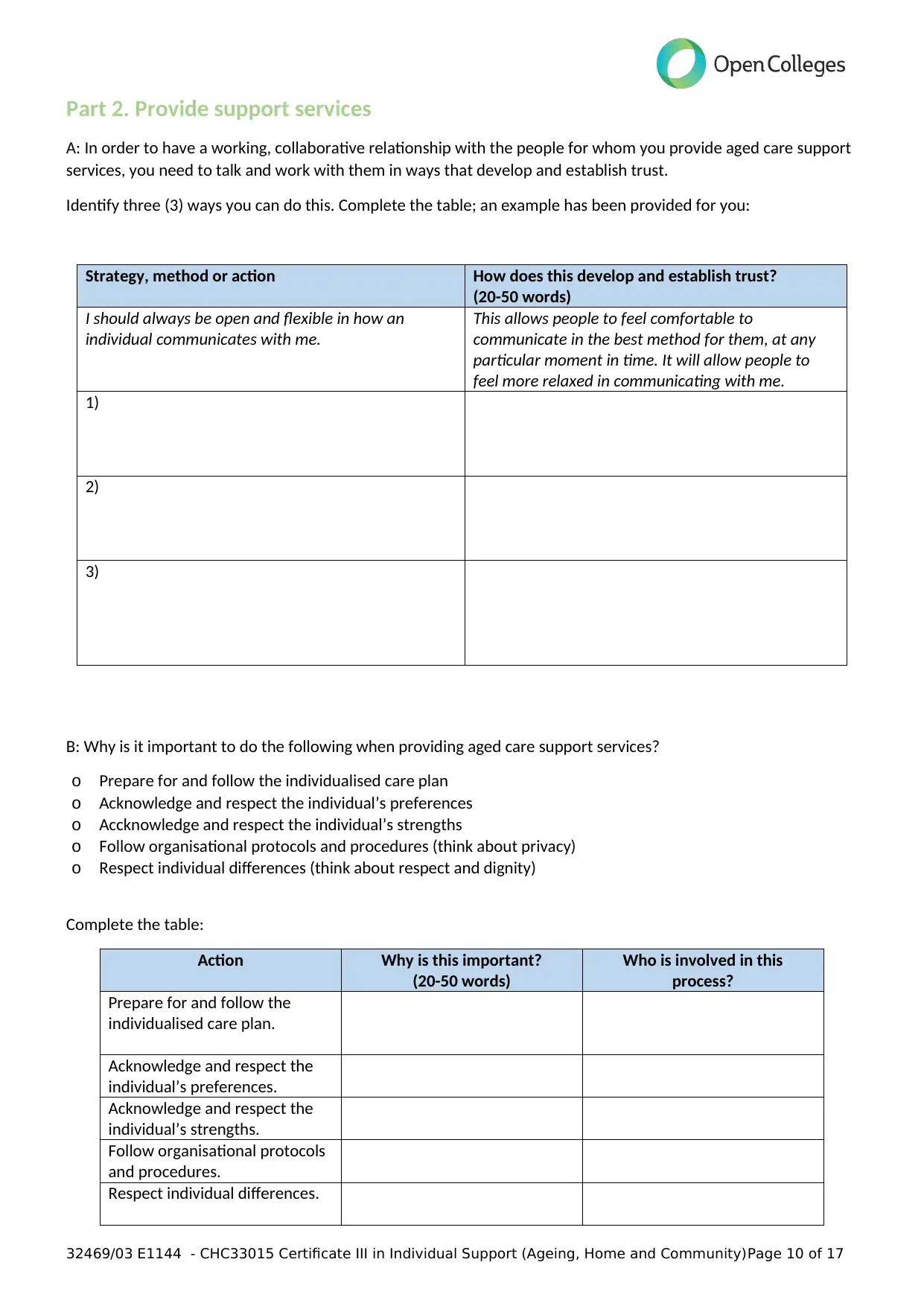
Part 2. Provide support services
A: In order to have a working, collaborative relationship with the people for whom you provide aged care support
services, you need to talk and work with them in ways that develop and establish trust.
Identify three (3) ways you can do this. Complete the table; an example has been provided for you:
Strategy, method or action How does this develop and establish trust?
(20-50 words)
I should always be open and flexible in how an
individual communicates with me.
This allows people to feel comfortable to
communicate in the best method for them, at any
particular moment in time. It will allow people to
feel more relaxed in communicating with me.
1)
2)
3)
B: Why is it important to do the following when providing aged care support services?
o Prepare for and follow the individualised care plan
o Acknowledge and respect the individual’s preferences
o Accknowledge and respect the individual’s strengths
o Follow organisational protocols and procedures (think about privacy)
o Respect individual differences (think about respect and dignity)
Complete the table:
Action Why is this important?
(20-50 words)
Who is involved in this
process?
Prepare for and follow the
individualised care plan.
Acknowledge and respect the
individual’s preferences.
Acknowledge and respect the
individual’s strengths.
Follow organisational protocols
and procedures.
Respect individual differences.
32469/03 E1144 - CHC33015 Certificate III in Individual Support (Ageing, Home and Community)Page 10 of 17
A: In order to have a working, collaborative relationship with the people for whom you provide aged care support
services, you need to talk and work with them in ways that develop and establish trust.
Identify three (3) ways you can do this. Complete the table; an example has been provided for you:
Strategy, method or action How does this develop and establish trust?
(20-50 words)
I should always be open and flexible in how an
individual communicates with me.
This allows people to feel comfortable to
communicate in the best method for them, at any
particular moment in time. It will allow people to
feel more relaxed in communicating with me.
1)
2)
3)
B: Why is it important to do the following when providing aged care support services?
o Prepare for and follow the individualised care plan
o Acknowledge and respect the individual’s preferences
o Accknowledge and respect the individual’s strengths
o Follow organisational protocols and procedures (think about privacy)
o Respect individual differences (think about respect and dignity)
Complete the table:
Action Why is this important?
(20-50 words)
Who is involved in this
process?
Prepare for and follow the
individualised care plan.
Acknowledge and respect the
individual’s preferences.
Acknowledge and respect the
individual’s strengths.
Follow organisational protocols
and procedures.
Respect individual differences.
32469/03 E1144 - CHC33015 Certificate III in Individual Support (Ageing, Home and Community)Page 10 of 17
Paraphrase This Document
Need a fresh take? Get an instant paraphrase of this document with our AI Paraphraser
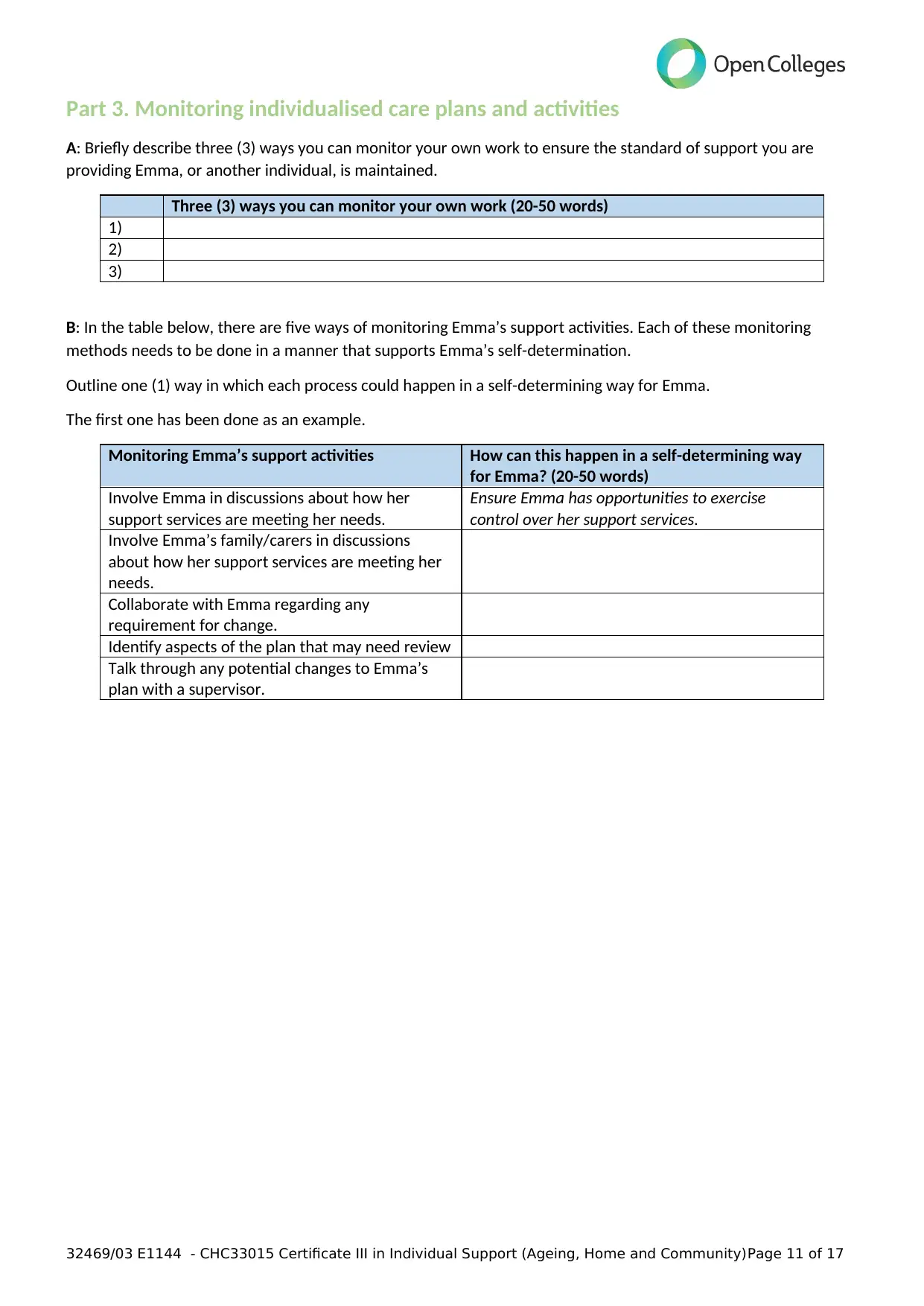
Part 3. Monitoring individualised care plans and activities
A: Briefly describe three (3) ways you can monitor your own work to ensure the standard of support you are
providing Emma, or another individual, is maintained.
Three (3) ways you can monitor your own work (20-50 words)
1)
2)
3)
B: In the table below, there are five ways of monitoring Emma’s support activities. Each of these monitoring
methods needs to be done in a manner that supports Emma’s self-determination.
Outline one (1) way in which each process could happen in a self-determining way for Emma.
The first one has been done as an example.
Monitoring Emma’s support activities How can this happen in a self-determining way
for Emma? (20-50 words)
Involve Emma in discussions about how her
support services are meeting her needs.
Ensure Emma has opportunities to exercise
control over her support services.
Involve Emma’s family/carers in discussions
about how her support services are meeting her
needs.
Collaborate with Emma regarding any
requirement for change.
Identify aspects of the plan that may need review
Talk through any potential changes to Emma’s
plan with a supervisor.
32469/03 E1144 - CHC33015 Certificate III in Individual Support (Ageing, Home and Community)Page 11 of 17
A: Briefly describe three (3) ways you can monitor your own work to ensure the standard of support you are
providing Emma, or another individual, is maintained.
Three (3) ways you can monitor your own work (20-50 words)
1)
2)
3)
B: In the table below, there are five ways of monitoring Emma’s support activities. Each of these monitoring
methods needs to be done in a manner that supports Emma’s self-determination.
Outline one (1) way in which each process could happen in a self-determining way for Emma.
The first one has been done as an example.
Monitoring Emma’s support activities How can this happen in a self-determining way
for Emma? (20-50 words)
Involve Emma in discussions about how her
support services are meeting her needs.
Ensure Emma has opportunities to exercise
control over her support services.
Involve Emma’s family/carers in discussions
about how her support services are meeting her
needs.
Collaborate with Emma regarding any
requirement for change.
Identify aspects of the plan that may need review
Talk through any potential changes to Emma’s
plan with a supervisor.
32469/03 E1144 - CHC33015 Certificate III in Individual Support (Ageing, Home and Community)Page 11 of 17

C: As previously mentioned in Emma’s case, she sometimes feels isolated and would like more opportunities to
meet others. Due to frustration with this and her other circumstances, she can sometimes be verbally aggressive.
Knowing Emma’s situation, can you identify any situations of potential or actual risk? (50-100 words)
D:
How should you respond to any potential or actual risks in the scope of your own work role? (50-100 words)
E: When Emma is verbally aggressive, it is likely a sign of her unmet needs. In this scenario, it appears that one of
Emma’s needs is human contact, and a lack of this results in her needs being unmet and her feeling isolated. This
then manifests as verbal aggression.
Signs of unmet needs are often called ‘behaviours of concern.
Identify three (3) examples of behviours of concern as a sign of additional or unmet needs, and decide how you
would respond (take confidentiality, reporting and service provision into account).
Challenging behaviour What should you do?
(20-50 words)
1)
2)
3)
32469/03 E1144 - CHC33015 Certificate III in Individual Support (Ageing, Home and Community)Page 12 of 17
meet others. Due to frustration with this and her other circumstances, she can sometimes be verbally aggressive.
Knowing Emma’s situation, can you identify any situations of potential or actual risk? (50-100 words)
D:
How should you respond to any potential or actual risks in the scope of your own work role? (50-100 words)
E: When Emma is verbally aggressive, it is likely a sign of her unmet needs. In this scenario, it appears that one of
Emma’s needs is human contact, and a lack of this results in her needs being unmet and her feeling isolated. This
then manifests as verbal aggression.
Signs of unmet needs are often called ‘behaviours of concern.
Identify three (3) examples of behviours of concern as a sign of additional or unmet needs, and decide how you
would respond (take confidentiality, reporting and service provision into account).
Challenging behaviour What should you do?
(20-50 words)
1)
2)
3)
32469/03 E1144 - CHC33015 Certificate III in Individual Support (Ageing, Home and Community)Page 12 of 17
⊘ This is a preview!⊘
Do you want full access?
Subscribe today to unlock all pages.

Trusted by 1+ million students worldwide
1 out of 17
Related Documents
Your All-in-One AI-Powered Toolkit for Academic Success.
+13062052269
info@desklib.com
Available 24*7 on WhatsApp / Email
![[object Object]](/_next/static/media/star-bottom.7253800d.svg)
Unlock your academic potential
Copyright © 2020–2026 A2Z Services. All Rights Reserved. Developed and managed by ZUCOL.




